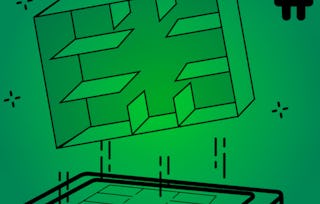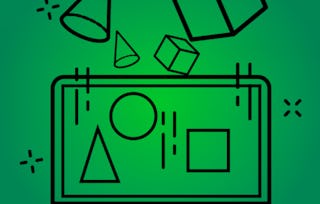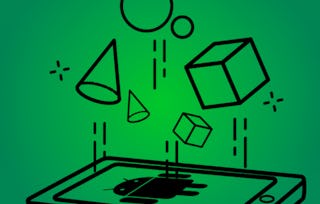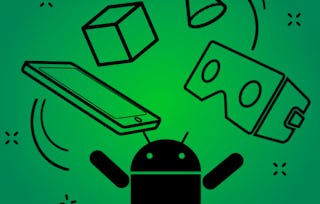This course is an ideal introduction into creating virtual environments in Android. This course is unique as it covers a range of tools and techniques to create immersive 3D environments, giving you a rounded skill set in this growing field. By the end of this course, you will really be able to bring your VR ideas to life!

3D Graphics in Android: Sensors and VR

3D Graphics in Android: Sensors and VR
This course is part of Advanced App Development in Android Specialization

Instructor: Benny Lo
11,487 already enrolled
Included with
(16 reviews)
Recommended experience
Skills you'll gain
Details to know

Add to your LinkedIn profile
7 assignments
See how employees at top companies are mastering in-demand skills

Build your subject-matter expertise
- Learn new concepts from industry experts
- Gain a foundational understanding of a subject or tool
- Develop job-relevant skills with hands-on projects
- Earn a shareable career certificate

There are 4 modules in this course
In this first module, we're going to look at some core functions which we can use within Android to create 3D objects and scenes. We'll begin by looking at how we can add animation to 3D objects and make these interactive using touch control. We'll then look at using lighting and reflection to make our 3D objects look more realistic.
What's included
10 videos4 readings3 assignments2 discussion prompts
In this module, we're going to look at making scenes and objects even more realistic. We'll begin by learning how to apply textures to objects. We'll then look at creating multiple 3D objects and how to combine these using transparency and blending.
What's included
9 videos3 readings1 assignment2 peer reviews2 discussion prompts
In this module, we'll build on the topics we've covered so far to create interactive virtual environments. We'll begin by looking at what sensors are available on Android phones and how we can use them. We'll then look at the frame buffer and the effects we can produce with it. Finally, we'll look at implementing the VR binocular view.
What's included
9 videos2 readings3 assignments1 peer review2 discussion prompts
In this final module, you will apply everything you have learned into a summative assignment by creating a VR app which uses binocular view.
What's included
1 video1 reading1 peer review1 discussion prompt
Earn a career certificate
Add this credential to your LinkedIn profile, resume, or CV. Share it on social media and in your performance review.
Instructor

Offered by
Explore more from Mobile and Web Development
 Status: Free Trial
Status: Free TrialImperial College London
 Status: Free Trial
Status: Free TrialImperial College London
 Status: Free Trial
Status: Free TrialImperial College London
 Status: Free Trial
Status: Free TrialImperial College London
Why people choose Coursera for their career

Felipe M.

Jennifer J.

Larry W.

Chaitanya A.

Open new doors with Coursera Plus
Unlimited access to 10,000+ world-class courses, hands-on projects, and job-ready certificate programs - all included in your subscription
Advance your career with an online degree
Earn a degree from world-class universities - 100% online
Join over 3,400 global companies that choose Coursera for Business
Upskill your employees to excel in the digital economy
Frequently asked questions
To access the course materials, assignments and to earn a Certificate, you will need to purchase the Certificate experience when you enroll in a course. You can try a Free Trial instead, or apply for Financial Aid. The course may offer 'Full Course, No Certificate' instead. This option lets you see all course materials, submit required assessments, and get a final grade. This also means that you will not be able to purchase a Certificate experience.
When you enroll in the course, you get access to all of the courses in the Specialization, and you earn a certificate when you complete the work. Your electronic Certificate will be added to your Accomplishments page - from there, you can print your Certificate or add it to your LinkedIn profile.
Yes. In select learning programs, you can apply for financial aid or a scholarship if you can’t afford the enrollment fee. If fin aid or scholarship is available for your learning program selection, you’ll find a link to apply on the description page.
More questions
Financial aid available,

